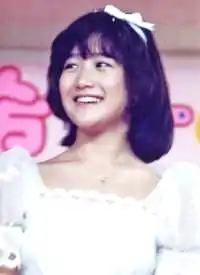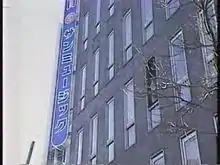Yukiko Okada
Yukiko Okada (岡田 有希子, Okada Yukiko, August 22, 1967 – April 8, 1986) was a Japanese idol and winner of the talent show Star Tanjō! in Tokyo, Japan.
Yukiko Okada | |
|---|---|
岡田 有希子 | |
 Yukiko Okada in 1984 | |
| Born | Kayo Satō (佐藤 佳代) August 22, 1967 Ichinomiya, Aichi, Japan |
| Died | April 8, 1986 (aged 18) Shinjuku, Tokyo, Japan |
| Cause of death | Suicide |
| Burial place | Aisai, Aichi |
| Nationality | Japanese |
| Other names | Yukko |
| Occupation | Singer, actress, model |
| Years active | 1983–1986 |
Early life
Okada was born as Satō Kayo (佐藤佳代) on August 22, 1967, the second daughter of the Satō family. The family later moved to Nagoya. In elementary school, Okada loved to read, especially manga, and she was a talented artist. In junior high school, Okada wanted to become a singer and applied for every possible audition, anything from major productions to the smallest talent recruitment, hoping to become a star. She was rejected every time until she was finally accepted to a TV talent program, Star Tanjō! on Nippon Television – similar to Star Search, though the final stage was her singing to get interest from talent agents – singing Kitahara Sawako's MY BOYFRIEND for the audition, and Nakamori Akina's Slow Motion for the final round, which she won in March 1983.
Career
On April 21, 1984, Okada released her first single, "First Date", written by Mariya Takeuchi. She was nicknamed "Yukko" (ユッコ) by her fans, which is a common abbreviation for the name "Yukiko" in the Japanese language.
That year, Okada won Rookie of the Year, and was awarded the 26th Japan Record Awards Grand Prix Best New Artist Award for her third single, "-Dreaming Girl- Koi, Hajimemashite", also written by Takeuchi.
Okada played the leading role in her first television drama Kinjirareta Mariko (The Forbidden Mariko), in 1985. Her 1986 single "Kuchibiru Network", written by Seiko Matsuda and composed by Ryuichi Sakamoto, reached number one on the Oricon weekly singles chart dated February 10, 1986.
Death

On April 8, 1986, Okada was found with a slashed wrist in her gas-filled Tokyo apartment, crouching in a closet and crying. She was discovered by a rescue team called in by the apartment's manager after other residents noticed the smell of gas. Okada's manager eventually arrived and took her to the nearby Kitano Aoyama Hospital, where her injuries were treated and was brought to the Sun Music Building. While Fudaka, the manager of the building and the staff were discussing how to avoid a media scandal, Okada ran up to the stairs, took off her shoes and jumped from the seven-story building, resulting in instant death. It was 12:15 PM, JST.[1][2] The reason for the suicide is still unknown, though it has been speculated it was due to Okada wanting a relationship with Tōru Minegishi, who had previously rejected her. This is due to Okada saying "I thought of someone"[3] when replying to why she tried to kill herself at her apartment and to her manager discovering notes written by Okada describing her longing to be with Minegishi. Some of these notes ended with: "I wanted to see him again" and "My heart has nowhere else to go."[4]
Her fans were shocked and shattered by her untimely death. It resulted in many copycat suicides in Japan, soon christened with the neologism "Yukko Syndrome." Okada was cremated and her remains were interred in a family vault at a Buddhist temple in Jōman-ji, Nagoya, Japan.[5][6]
Discography
Singles
- "First Date" (1984) Glico's Cafe Jelly jingle
- "Little Princess" (1984)
- "Dreaming Girl-Koi, Hajimemashite" (1984) Glico's "Special Chocolate" jingle
- "Futari Dake no Ceremony" (1985) Toshiba's "Let's Chat" jingle
- "Summer Beach" (1985) Glico's Cafe Jelly jingle
- "Kanashii Yokan" (1985)
- "Love Fair" (1985) Glico's Cecil Chocolate jingle
- "Kuchibiru Network" (1986) Kanebo's lipstick commercial
- "Hana no Image" (1986) [released posthumously]
- "Believe in You" (strings version 2002) [released posthumously]
Albums
- Cinderella (シンデレラ))
- Okurimono (贈りもの, Gift) (Compilation Album)
- Fairy
- Jyūgatsu no Ningyo (十月の人魚, October Mermaid)
- Okurimono II (贈りものII, Gift II) (Compilation Album)
- Venus Tanjō (ヴィーナス誕生, Birth of Venus)
- Okurimono III (贈りものIII, Gift III) (Heritage, released posthumously) (Compilation Album)
- All Songs Request (posthumous singles collection)
References
- "Yukiko Okada". ACA Music. Retrieved May 23, 2015.
- Yosha Research
- Okada Yukiko Archived July 22, 2006, at the Wayback Machine
- John Greenless, Paradox ò Japan Epidemic of suicides among young people, The Glasgow Herald – 11. Apr. 1987, trang 37
- Japanese Society Since 1945 by Edward R. Beauchamp, Taylor & Francis, 1998, ISBN 0-8153-2732-3, trang 97
- Japanese Youth and the Yukiko Syndrome, Far Eastern Economic Review, July 17, 1986
External links
| Preceded by The Good-Bye |
Japan Record Award for Best New Artist 1984 |
Succeeded by Miho Nakayama |
| Preceded by The Good-Bye |
FNS Music Festival for Best New Artist 1984 |
Succeeded by Minako Honda |
| Preceded by The Good-Bye, Sayuri Iwai, Yasuko Kuwata |
Shinjuku Music Festival for Gold Prize 1984 (with : Koji Kikkawa) |
Succeeded by Shigeyuki Nakamura, Minako Honda |
| Preceded by The Good-Bye |
Ginza Music Festival for Grand Prix 1984 |
Succeeded by Noriko Matsumoto |